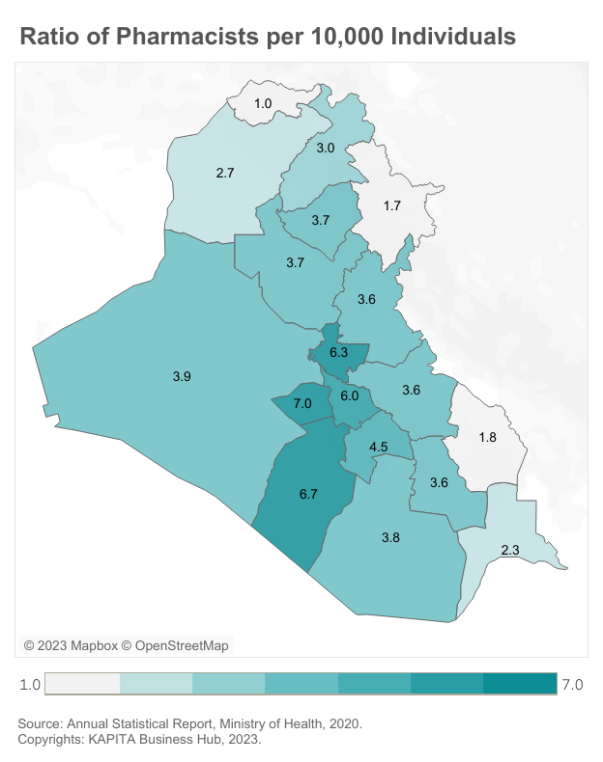This brief can be cited as:
KAPITA. "The Iraqi Pharmaceutical Industry: Strengths, Weaknesses, Opportunities and Threats”. September 30, 2023. https://bit.ly/46cTZoO

In this report, we will look into the history of the pharmaceutical industry in Iraq. The pharmaceutical sector in Iraq has a long history dating back to 1920 when the first pharmaceutical manufacturer, Qatrat Alayn, was established.
However, it was not until 1961, following the establishment of the Industrial Development Law, that the private sector witnessed an increase in pharmaceutical factories, with only four out of the ten existing factories being licensed by the Ministry of Health. As of 2005, there were 17 pharmaceutical manufacturers in Iraq employing 4,034 people, while currently, in 2021, Iraq has a total of 23 national pharmaceutical manufacturers.
National drug manufacturers only produce finished products, and all active ingredients are imported from outside Iraq. There are no facilities in Iraq equipped with the advanced technologies required for the production of biological medicine.
This report provides a clear description of the hierarchy of regulatory bodies for medical products: administrative and technical branches of the Ministry of Health and the associated responsibilities. The State Company for Drugs and Medical Appliances, also known as KIMADIA, is a state-owned company responsible for the procurement, distribution, importation, and any other related procedure of medicines, medical supplies, and equipment for the public healthcare system. In the Kurdistan region, medicine procurement is done via KIMADIA, which delivers medicine to public health care and directly via the local health directorates.
Medicine procurement for the private sector is different from that of the public sector. National drug manufacturers, registered drug wholesalers, and scientific bureaus supply medicines directly to the private sector. In the public sector, however, medicine is provided free of charge.
Halfway through, we examine statistics related to the pharmaceutical sector. We present data on the distribution of pharmacists and pharmacies across the country. The distribution suggests the uneven spread of pharmacists, with Baghdad having the largest total number of pharmacists and pharmacies in Iraq, more than 5,000 pharmacists and 1,500 pharmacies. The lowest number of registered pharmacists is in Maysan, with 212 pharmacists, and in Duhok, with 140 pharmacists.


To further understand the scene of the Iraqi drug industry, we conducted a detailed SWOT analysis, a comprehensive desk review of published literature, and interviews with key figures in the pharmaceutical industry, such as manufacturers, distributors, regulators, and healthcare providers.
Despite the challenges, the pharmaceutical sector has witnessed the rise of many startups. The focus of most of these startups is in the B2B area of the private sector. They are digital platforms providing a wide range of services, such as marketplace, logistics, delivery solutions, and online payment.
This report concludes with a list of recommendations on the potential of Iraq's pharmaceutical sector. It has great potential for growth and development since the sector itself is directly involved in the changing healthcare scene.
This brief can be cited as:
KAPITA. "The Iraqi Pharmaceutical Industry: Strengths, Weaknesses, Opportunities and Threats”. September 30, 2023. https://bit.ly/46cTZoO
Strengths, Weaknesses, Opportunities and Threats
A Brief of the Iraqi Agritech Potential and Challenges
Many of the big businesses we know today were only ideas. Ideas that tackle real needs can become successful businesses if they... read more
Scope, Challenges, and New Horizons
Mobile & Web Applications Solutions and Timelines
An Overview of Food, Beverages, and Dairy Products